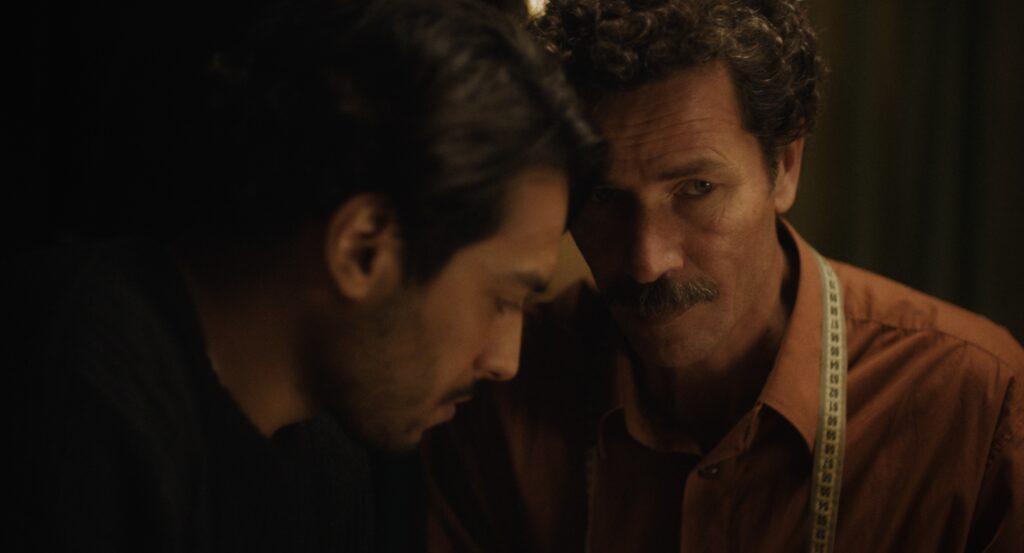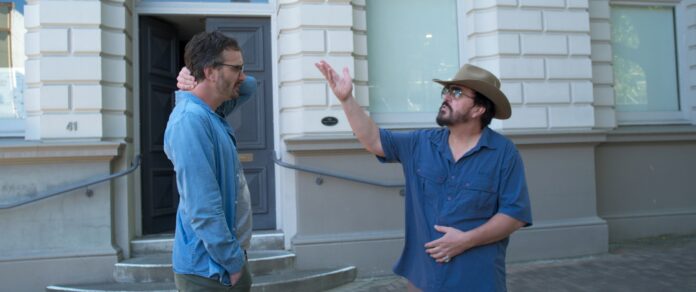The Philadelphia Film Festival unspools October 19 to 30 with more than 120 features, shorts and documentaries screening at the Philadelphia Film Center, PFS Bourse, and the PFS East.
The festival has more than a dozen films by LGBTQ talent or featuring queer characters. Moviegoers will have a chance to see some of the most eagerly anticipated fall films, including: “The Inspection,” former Philadelphia resident Elegance Bratton’s feature about a young gay Black man (Jeremy Pope) who joins the Marines; “The Whale” starring Brendan Fraser in an Oscar-buzzy turn as a severely obese gay man trying to connect with his estranged daughter; “Glass Onion: A Knives Out Mystery,” starring out performer Janelle Monáe in a sequel to the popular whodunnit; and “Close,” gay filmmaker Lukas Dhont’s tender, award-winning drama about two 13-year-old boys who suffer a tragedy. In addition, the drama “How to Blow Up a Pipeline,” features two lesbians as part of the film’s group of environmental activists.
Among the documentaries, out gay filmmaker Ryan White’s “Good Night Oppy” chronicles the Mars Exploration Rover Opportunity, and “The Return of Tanya Tucker — Featuring Brandi Carlile” chronicles the efforts of out singer Carlile to help re-introduce Tucker and her music to the world. The festival’s closing night film is Laura Poitras’ documentary “All the Beauty and the Bloodshed,” about Nan Goldin and the Sackler family.
Among the films available for preview, one of the best films at the fest is “The Blue Caftan,” an exquisite slow-burn romantic drama from Morocco, a country where homosexuality is illegal. Halim (Saleh Bakri) is a maalem, a tailor who works painstakingly by hand. He sews gorgeous caftans that are sold in the shop he and his wife, Mina (Lubna Azabal), own. But they are behind in their work, and she is in ill health, which is why Halim is training Youssef (Ayoub Missioui), a handsome new apprentice, to learn this dying craft. The looks Halim and Youssef exchange are full of smoldering desire, and when they touch — as when Halim trains Youssef to cut a collar or guide a needle — it is downright erotic. “The Blue Caftan” subtly depicts the love that develops between Halim and Youssef, as well as Halim’s deep affection for Mina. How Halim grapples with his sexuality and his conflicted thoughts and feelings — he is periodically seen having anonymous sexual trysts with men at the local hammam — forms the heart of this poignant character study. Bakri makes Halim’s internalized guilt and shame palpable and Azabal and Missioui respectively deliver steely and sensitive performances. This is a tender, achingly beautiful film.

“Mister Organ” has out gay filmmaker David Farrier (“Tickled”) going down another quirky rabbit hole when he investigates the title character, Michael, aka Michael Organ. Farrier, a journalist, heard about Organ clamping cars outside an antique shop and charging $760 for a half hour of parking. He uncovers other unusual information — Organ pretended to be a Prince or a Count, and he spent three years in jail for stealing a yacht. When Organ sues Farrier over some discarded signs from the closed antique store, it only drives the filmmaker to want to know more about this unusual man. However, as Farrier meets, hangs out with, and interviews Organ over several years, he becomes worn down by this “black hole” of a man. Farrier talks with folks who knew Organ and they recount troubling episodes of abuse, from Organ appropriating a former roommate’s story of homophobia to a tragedy involving another gay man. As this bizarre tale unfolds, “Mister Organ” is fascinating and frustrating in equal measure — which is exactly how Farrier experienced it, and how viewers will, too.
Two unsettling queer horror films will screen at the festival. “Attachment” is a terrific Jewish folk horror film, written and directed by Gabriel Bier Gislason. This Danish romantic thriller has Maja (Josephine Park), a former TV star, meeting cute with Leah (Ellie Kendrick) in a Copenhagen bookstore. After going back to Maja’s for tea, the young women have some wine, and some sex. The next morning, something freaky happens that prompts Maja to return to London with Leah. Maja soon meets Chana (Sofie Gråbøl), Leah’s overprotective mother, and Lev (David Dencik), a bookstore owner who schools her on the Kabbalah and dybbuks, which involves the soul of a sinful dead person hosted in a living being. As things get weird for the couple, “Attachment” depicts the power struggle for Leah’s body and mind in ways that are steeped more in superstition than scares.
Bisexual director Michelle Garza Cervera makes an auspicious feature film debut with her Mexican horror film, “Huesera.” Valeria (an impressive Natalia Solián) and her husband Raúl (Alfonso Dosal) are excited when they find out they are pregnant. However, Valeria soon starts having strange experiences. She sees a neighbor jump out the window across the street — and yet, the broken body moves, then disappears. Did it happen, or was she hallucinating? Valeria pays a visit to a woman involved in spiritualism/occultism, who might be able to help her. But she struggles when she babysits for her niece and nephew, and senses an intruder only to have bad things happen. Something is definitely wrong, and Valeria’s fragile mindset is not improved when she gets romantically involved with Octavia (Mayra Batalla), an old friend/girlfriend. “Huesera” conveys the anxiety of impending motherhood with all the doubts and discomfort Valeria experiences, and Cervera features striking visuals and a nifty sound design) to give viewers an unsettling experience.
For younger viewers, “Before I Change My Mind,” is queer director/cowriter Trevor Anderson’s feature film debut, set in 1987 Canada. Robin (Vaughan Murrae) reluctantly befriends Carter (Dominic Lippa), a school bully. They bond during a school trip, but things get complicated when they meet Izzy (Lacey Oake) at an ersatz theatrical production of “Jesus Christ Superstar” (the show is the film’s lowest point). Carter is attracted to Izzy, Robin is attracted to Carter, and Izzy is attracted to Robin. The queer angle here is that Robin’s gender is ambiguous. That makes for a possibly interesting examination of identity, but Anderson fails to explore these themes in any depth, which is one of many drawbacks for this well-meaning but flawed film.
The Philadelphia Film Festival is screening two queer classics, a new 30th anniversary screening of Sally Potter’s gender-bender, “Orlando,” starring Tilda Swinton as a young nobleman who lives 400 years as both male and female, and a 50th anniversary screening of John Waters’ scandalous “Pink Flamingos” which features Divine (Divine) in her most notorious role — vying with Connie and Raymond Marble (Mink Stole and David Lochary) for the title of “Filthiest Person Alive.” “Pink Flamingos” also features Elizabeth Coffey Williams, PGN’s 2021 person of the year.
Two fabulous queer shorts screening in the Shorts Program 2 include “Warsha” about a queer Syrian immigrant (Khansa) whose high-risk construction work allows him the freedom to truly express himself, and “Chaperone” a flinty drama about a young man (Russell Kahn), who meets the title character (out actor Zachary Quinto), one night for a very specific purpose. Even if viewers see where things are headed, Quinto is fantastic in this memorable film.
For tickets, showtimes, venues, and more information visit https://filmadelphia.org/festival/.

